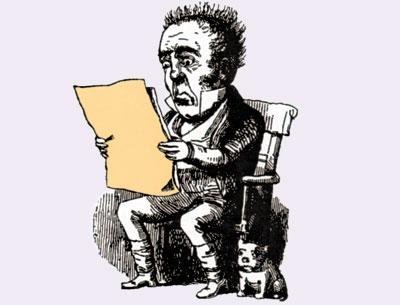On Getting It Wrong

It has been well established that the Internet, for all its wonders, early on fell into the wrong hands and since then has tended to bring out the worst in people. Rage, for one thing, as Bill Henderson of Springs points out in his editor’s note for “Rotten Reviews Redux,” a new reissue of the Pushcart Press’s popular 1986 “literary companion.” Rage that when paired with the safety of anonymity leads to an explosion of dreck online the spray of which reaches even a Luddite like Mr. Henderson, who professes to own no computer.
He writes of angry reviews, specifically, and, more specifically, of an ad hominem attack he endured related to “a little, otherwise well appreciated memoir I wrote,” presumably “All My Dogs.” Thus, this little book, a kind of corrective serving up example after example of reviewers’ wrongheadedness — even, or especially, on the part of history’s most eminent writers.
In 95 pages of quotations, you first of all expect a heavy dose of humor. And that it’s got: “We do not believe in the permanence of his reputation,” The Saturday Review wrote of the work of Charles Dickens. “Oblivion lingers in the immediate neighborhood” where dwells an “eccentric, dreamy, half-educated recluse” who defies “the laws of gravitation and grammar,” The Atlantic Monthly said in dismissing Emily Dickinson.
Further, the genius of Jane Austen was never such, in Ralph Waldo Emerson’s consideration of her “vulgar,” “sterile,” “pinched and narrow” novels. Shakespeare’s “A Midsummer Night’s Dream”? “Insipid, ridiculous,” recorded the great London diarist Samuel Pepys.
The snippets refer back as far as Chaucer (“obscene and contemptible”: Lord Byron), on up to 1961 and Walker Percy’s memorable “The Moviegoer,” snarkily judged by The New Yorker to be in need of “oil and a good checkup.”
But there’s more than that, more than karmic revenge. In the Sag Harbor writer Anthony Brandt’s original introduction, which alone is worth the $18.95 price of admission, he touches on not only his own queasy bout as a critic but the history of newspaper reviews (pure flackery at first), Kurt Vonnegut’s belief that fiction writers should never betray their own kind in print, and something harder to get at: When Virginia Woolf calls James Joyce’s “Ulysses” “brackish,” “pretentious,” “underbred,” and “a misfire,” we feel awe at the enthusiastic hacking at the great man’s knees, admiration at the verbal cannonade upon the walls of received wisdom. At this late date, it seems fresh.
“Rotten Reviews Redux” comes illustrated by Mary Kornblum and in a 5-by-7-inch format suited to the inside of a hung stocking.
